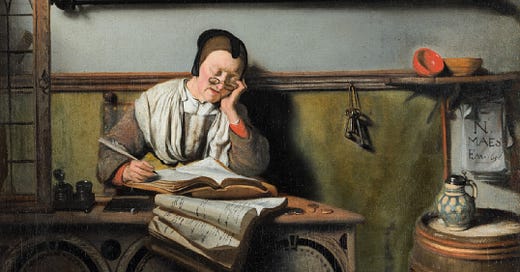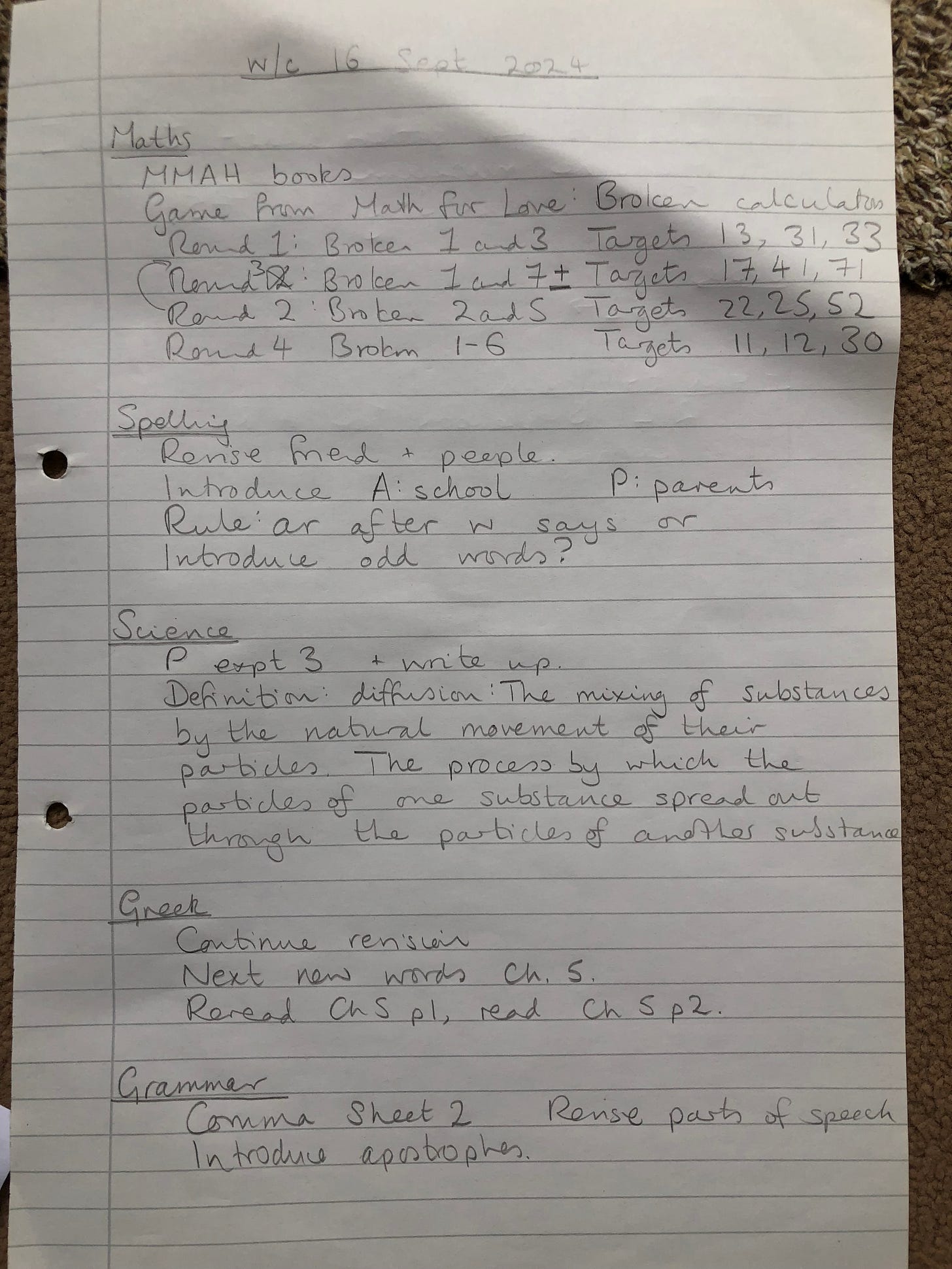In most things I am not a planner. I can’t meal plan to save my life. Booking anything more than a day in advance gives me instant anxiety that someone will come down with a sickness bug and we’ll have to cancel. The only thing I book ahead is the children’s dentist appointment. I am also not one of those people who gets excited by shiny new folders and colour-coordinated tabs and new pens.
But I have got the art of homeschool planning down to a fine art. Or at least, I’ve got it down to something that works for me, for now. I even quite like it, and most importantly it gives me some loose structure, and confidence that we’ll cover what we need to. As we’re now in the season of thinking about what next year’s education will look like, I thought I’d share what works for me, in case it might work for you, too.
My planning exists on three levels:
I do one annual plan.
About 3 times a year I do a plan for the term/semester/next few months. (We don’t strictly follow the school year, but I often find we need a break around the same time as schoolchildren do.)
Each weekend I do a plan for what I want to cover the coming week.

The annual plan
The annual plan is a mix of big picture and fine detail, depending on the subject. For history, for example, I follow the structure in The Well-Trained Mind, so next year (this September) we’ll move on to the Late Renaissance/Early Modern period. The annual plan will simply list the major events and individuals I want to cover. This year, the annual plan included the Tudors, but at the annual stage it literally just said ‘Tudors’. I knew we wouldn’t be getting to the Tudors until the summer, so I felt no need to start choosing books and planning outings nearly a year in advance.
For science, we also followed the Well-Trained Mind this year, but only loosely. The focus was on ‘visible’ science—plants, animals, the night sky, our bodies, the earth. Those loose headings were enough to help me choose books from the library and encourage conversations on relevant topics. The children haven’t yet started writing down their science work—I hope to start that for my daughter this autumn.
For maths, I spend quite a bit of time at this stage looking at different curricula. I look at the National Curriculum, summaries from Oxford Owl, and the very helpful curriculum from this London private school. For each child, I write down everything they need to cover (fractions, bar charts, multiplication, whatever), and condense it down so it fits on one page. I like to be able to see what we need to do at a glance.
(When I say ‘everything they need to cover’, I don’t mean that they have to learn everything just because someone, somewhere once put it on a curriculum. But I do want the children to be ready to go to school should the need arise, and I also find that by looking at a range of curricula I get a good idea of the likely range I can expect my children to fall within.)
Breaking it down
Then, every few months I look at the annual plan and work out the priorities for the next three months or so. Again, I need this to fit on one page, so it’s only a summary. I look back at what the children have or haven’t worked on so far, and anything from previous plans that we haven’t got to becomes a priority. I scribble down particular trips I want to organise, and I also plan what subjects we’ll cover on each day of the week, which I find helps enormously when I wake up in the morning. Even though it only says ‘Tuesday: maths, history, French’, that means I’ve already made the decision about what subjects we’re doing today.
This is when a broad heading like ‘Tudors’ starts to take on a bit more shape, but not a lot. I might list out a few key people or events under that heading, and I might start piling books into a virtual shopping basket, or reserving them from the library if it’s a subject we’re coming to imminently. Often though, I just use whatever happens to be on the shelves when we visit. Our libraries are excellent, and did I mention how bad I am at advance planning?
Week by week
Each weekend (yes, it’s often last thing on Sunday night) I make a one-page plan for the week ahead, subject by subject. (Why does everything have to fit on one page? Because it means I don’t have to hold anything in my memory, it’s all right there in front of me. I like to make things easy for myself, and I know that out of sight is out of mind.)
This is where I finally go into some detail: the particular pages we’ll read from the history books, the spellings I’ll introduce that week, the maths game we’ll play together. This means that when I look at my plan for what subjects to cover each day and see that today’s a history day, I know exactly what book to turn to and what page to open it at.
Again, I look back at the previous week and see what we didn’t get to. Sometimes it’s ok to just skip it—if we didn’t play a certain maths game last week, it’s probably not essential we play it this week. On the other hand, if we didn’t manage to read anything about Henry VIII, there’s no point in skipping ahead to Elizabeth I.
A plan, not a promise
Reading people’s plans in black and white makes them look very official. I want to be very clear that although this is an accurate summary of what I do, it’s not exactly what I do, every week. Some weekends I don’t manage to make a plan, and we muddle through regardless. Some weekends I do make a plan, but it turns out to be just one of those weeks, and we don’t get to much of what I’d hoped to. If we wake up and it’s a gorgeous day that’s just begging us to step outside and enjoy it, that’s what we do. Forget the plan. Gorgeous days are precious! We can learn different things in the sunshine!
And I don’t take it as a failure when I look back at a previous plan and see we didn’t get to everything—in fact, I expect that there will be things we don’t get to. My planning system is meant to be a support, not a straitjacket. It’s meant to help me, not make me feel bad. I think it’s human nature to be a bit over-ambitious when we plan, and ambition is no bad thing. But children get ill, parents get tired, the French curriculum you thought they’d love turns out to be a flop… and that’s all ok. We carry on.
Update: Following a few requests, here are some examples of our weekly plan and how it looks on a particular week. Bear in mind these are just for my own use so full of scribbles and working-it-out-as-I-go-along!

Homeschool planning posts I’ve enjoyed recently that you might like to have a look at include:
sharing her plans subject by subject. Eloise is planning on doing Latin, Greek, French, and Old English this year with her daughter. You have been warned! But this is a very relatable and encouraging post. from The Gothic Homeschool shares her plans for her five school-age children (there’s a baby too), all at different stages in their education. from However Imperfectly shares a creative approach, slowing down the planning process, enjoying it, and gaining empathy.Thanks for reading. If you’re not subscribed to How We Homeschool, sign up for free and never miss a post.






I’ve not homeschooled yet, as my oldest is 2, but this is basically how I planned when I was teaching high school! It’s very very helpful
I was curious if you could take a picture of what the plan looks like especially the week/day ones. I like the idea of one page too.